LIGHT YEAR
Event Location: Orange County STEM Saturday
Competition: Junior Solar Sprint
Division: 4-6 (JSS Green)
School: Bay Meadows Elementary
Team Size: 4
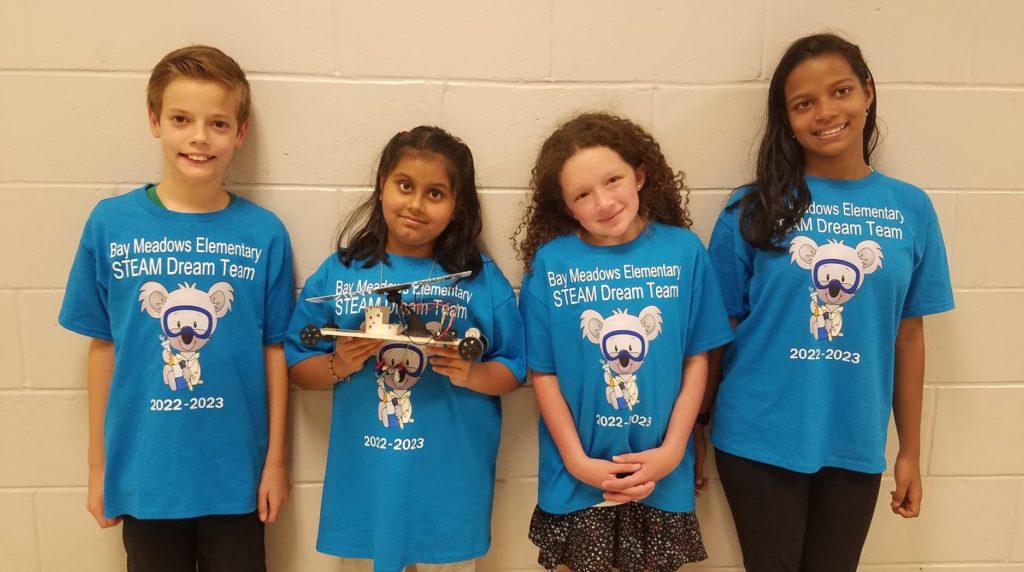
Hello! We are Team Light Year from Bay Meadows Elementary. Our race car is Light Year – it runs on solar power and nothing travels faster than light!
Energy Engineers:
Paayal and JP, 4th Grade
Camille and Alisha, 5th Grade
Our Goal:
To design and build a high-performance solar electric race car that is
a. sturdy and innovative.
b. steered by wire and able to safely carry a “passenger”.
c. able to switch to battery power for inclement weather – making it an all-weather car.
d. use as many green energy/ reusable components as possible.
Our Design Process:
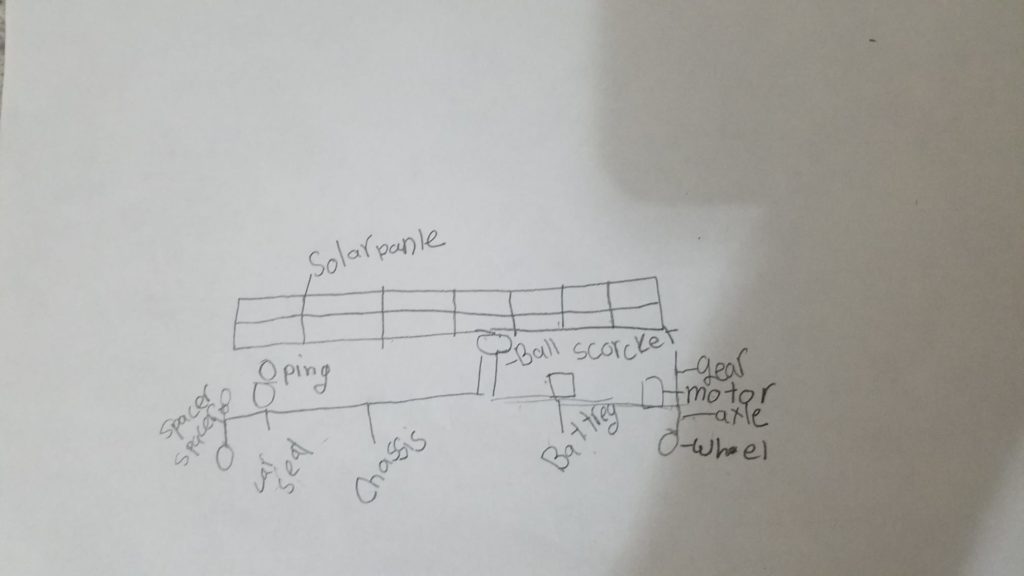
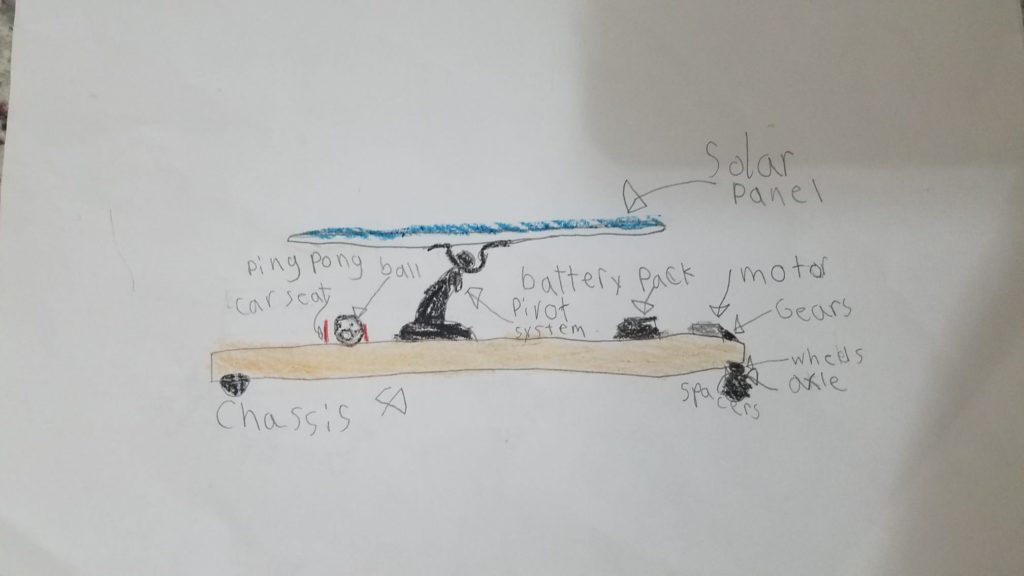
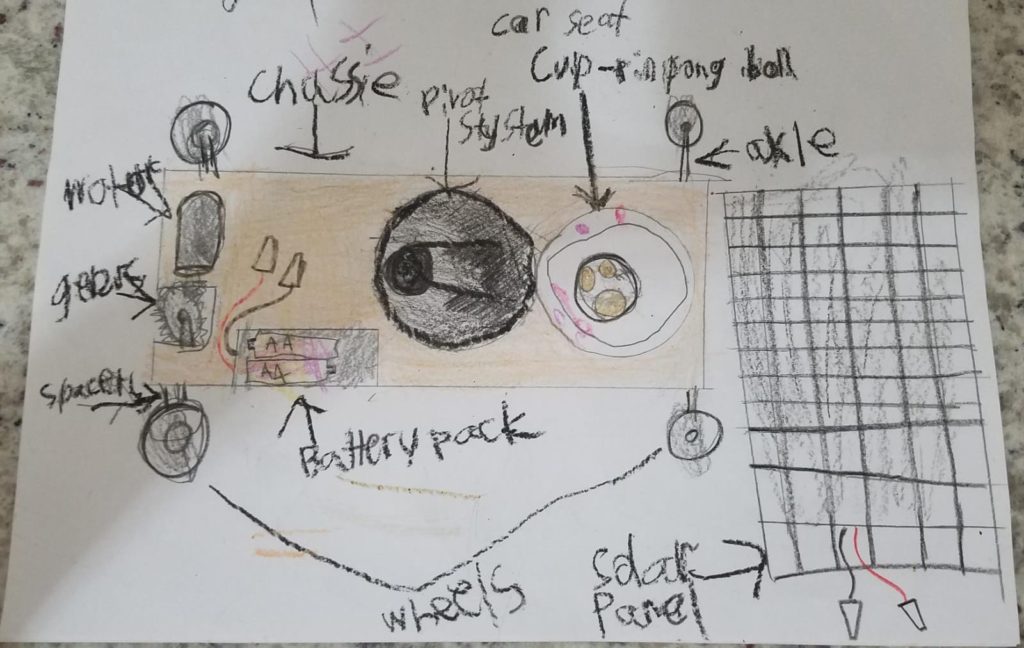
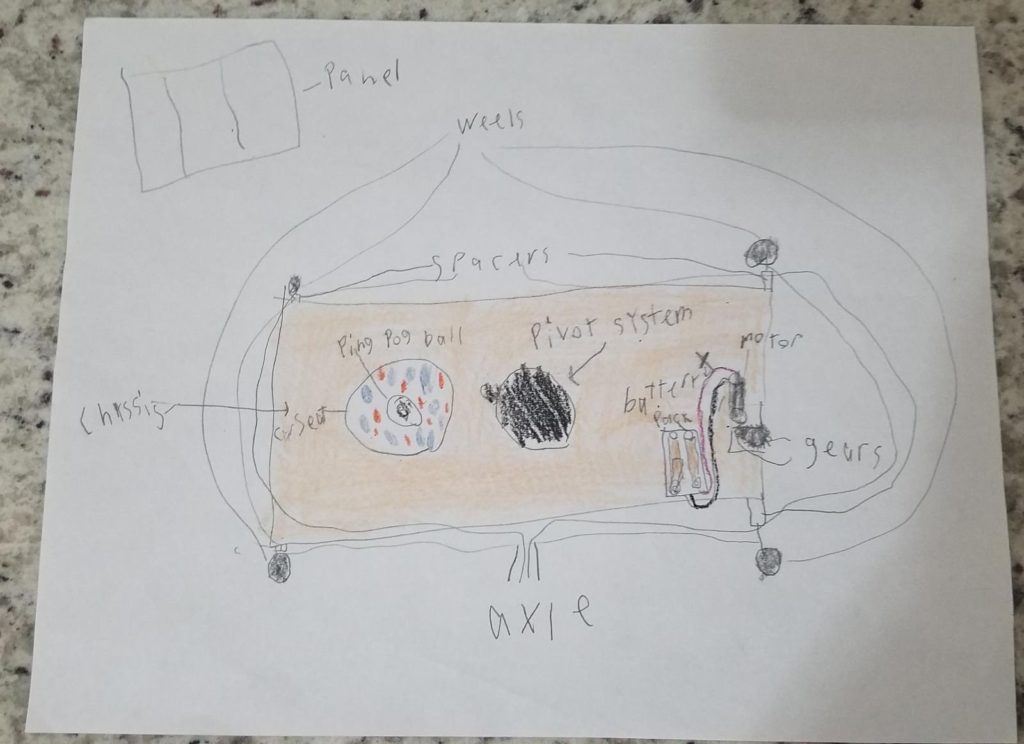
The Concept:
The solar panel in the car captures solar energy and converts it to electrical energy, which powers the motor. The motor then converts the electrical energy to mechanical energy, rotating the pinion gear. The pinion gear in turn rotates the spur gear which is mounted on the rear axle, making the rear wheels rotate thereby propelling the car.
Materials:
| New | Reused/ Repurposed |
|---|---|
1 Photovoltaic Panel 2 Balsawood Sheets 1 Motor 4 Alligator Clips 2 Pitsco GT-F Wheels 2 Pitsco GT-R Wheels 4 Nylon Spacers 2 Steel Axles 2 Plastic Gears 2 Wide Rubber Bands 1 Battery pack with switch | 1 Car Phone Mount 1 Cool-Melt Glue Gun Glue Sticks 1 Soldering Iron 1 Tin Lead Wire 1 Sandpaper 1 Monofilament Wire 1 Ping Pong Ball 1 Paper Cup 1 Foam Board 1 Coping Saw 1 Pencil 1 T-Square ruler 1 Tape Measure 1 Pair Scissors |
Our Car’s Evolution:
| Date | Time Spent (Hours) | Members Present | Task Performed/ Modifications (for pictures see below) | Obstacles Encountered | Plan for next meeting |
|---|---|---|---|---|---|
| 11/07/2022 | 0.5 | All members | We met with teachers to learn about the competition, collect the kit and look up the past competition so we can start designing our prototype. | None | Design the car |
| 11/10/2022 | 1.5 | Paayal JP Camille | We met virtually for this meeting. We went over the concept of a solar powered car, read the specifications and instructions sheet, talked about and designed our prototype on paper (see pictures above), estimated the number of times we will meet to complete the project. We inspected the items in the kit, listed the additional material we will need and decided to use as many reusable materials as possible. Our aim is a light weight and efficient car. We also started documenting the meetings. | None | Start building the first prototype |
| 11/12/2022 | 1 | All members | Prototype 1 We built our first prototype using a foam sheet cut to the specifications. Since the solar panel is one of the most important parts as it powers the car, we decided that we wanted it to pivot so we can move it in the direction of sunlight. We used a bamboo skewer and plastic straws to create a hinge. | Determining the placement of the solar panel and making sure that the hinge stays put at the angle we want it to. | The solar panel can now move up and down. We need to come up with ideas to make it pivot 360 degrees. |
| 11/16/2022 | 2 | All members | Prototype 2 We built our second prototype, again with a foam sheet. We used a mount for the solar panel. It has a ball and socket joint which can rotate 360 degrees giving us more flexibility and efficiency. This way, no matter the direction of the sun, we can turn the solar panel to get maximum sunlight. With little help, we were able to remove the parts that were not needed – like the suction cup and screws. Next, we mounted the second foam sheet on the mount – in place of the solar panel to make sure the mount is working. We also added a “passenger seat” for our “passenger”, the ping pong ball. | Weight of the car mount might slow down the car. | Include the motor and the wheels to ensure that we have a functioning car. |
| 11/18/2022 | 1.5 | All members | Prototype 3 During this meeting, we modified the second prototype to include the motor and the wheels, positioned and spaced them out so the center of gravity is maintained. Since this is a prototype, we did not want to fix anything permanently to the chassis. So, we used zip ties and cellophane tape instead. We used: Spur Gear – 60 teeth and Pinion gear – 20 Teeth, for a ratio 3:1 | None | Include the solar panel and test |
| 11/20/2022 | 1 | All members | Prototype 4 We included the solar panel to the prototype 3 to test the frame, structure and make sure that the pivot can balance the weight of the panel. We also planned and attached the other parts. We used zip tie to easily remove the panel. | The car runs well, but we realized that a. we will have to recalculate the gear ratio as the car is balancing on the Spur gear instead of the rear wheels. b. The foam panel is not sturdy enough to balance all the parts. c. The wheels and the gear move too much. We will need to include spacers. | Recalculate the gear ratio. Build the next prototype using a more permanent material – balsa wood |
| 11/21/2022 | 1.5 | All members | Prototype 5 Using a L-Square ruler, we measured and then with adult supervision and help, cut a notch in the balsa wood sheet to make a chassis and accommodate the gears. We marked where the axles will go, so they are parallel to each other and the chassis edges. This will make sure that the car runs straight. We fixed the front and back axles, wheels, spacers and gears. For the gears, we used – 50 tooth 1/8” bore for spur gear and will a 10 tooth 1/8” bore for pinion gear for a ratio of 5:1. | None | Complete the circuit and test the car. |
| 11/22/2022 | 2 | All members | We worked on the car’s circuit. With help, we soldered the alligator clips to the wires from both the solar panel and the backup battery holder. Next, we attached the motor and battery holder to the chassis. Then with a little help, mounted the solar panel to the pivot. We checked to make sure the motor worked on both solar and battery power. | Battery holder isn’t working and needs replacement. | Replace the battery holder. Test the car. |
| 11/25/2022 | 0.5 | All members | We replaced the battery. Tested the car inside the house on battery power. We cannot test the car on solar power due to rain and overall cloudy weather. We voted on the name of our car. | None | Attach the wire guide and test on solar power. Attach the wires to the chassis neatly. |
| 11/26/2022 | 2 | Paayal JP Camille | We attached the guide for the guide wire, tested the car on battery power. We also filmed the videos. | Overcast sky, could not test the car on solar power. | Test the car on solar power. |
| 11/29/2022 | 30 | All members | We conducted trials for solar power and using the guided wire. We completed the website. | None | Ready to demonstrate and race! |
Picture Log:
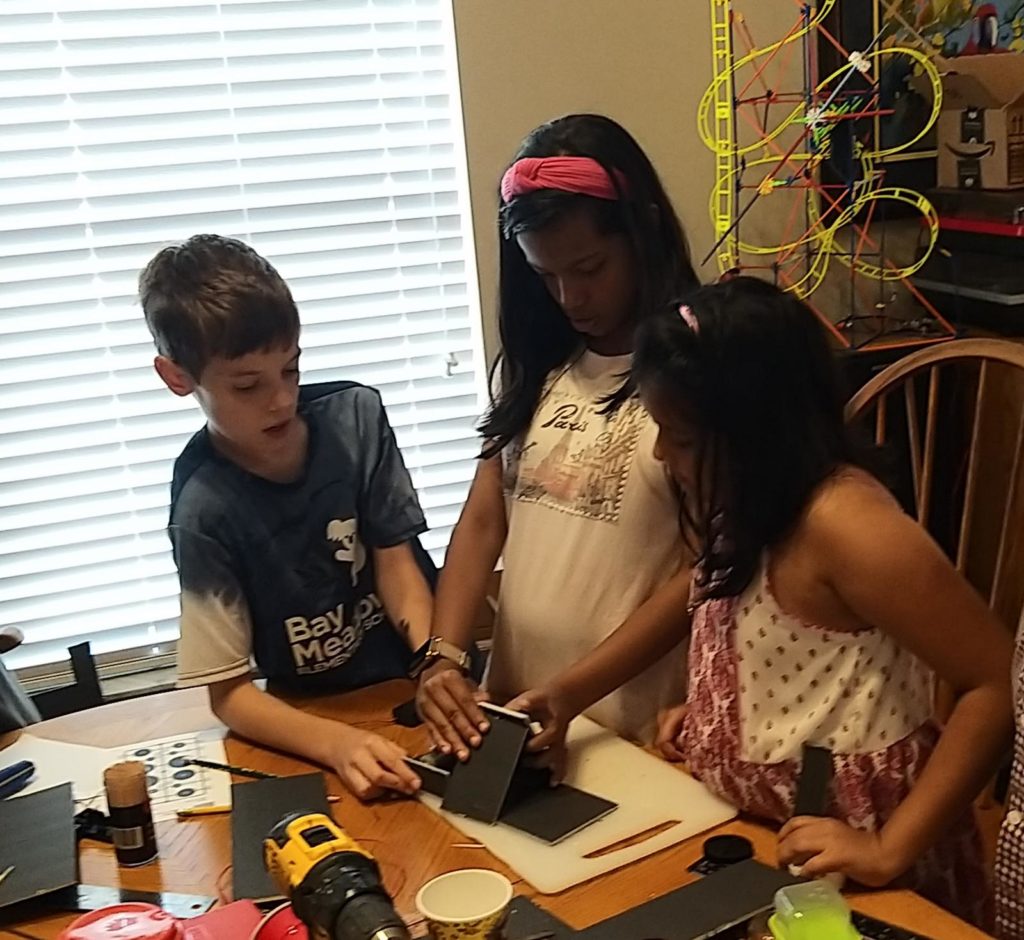
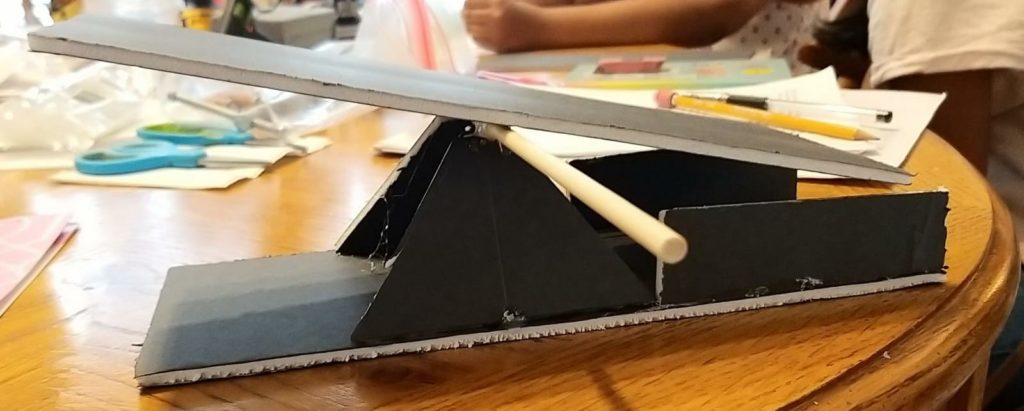
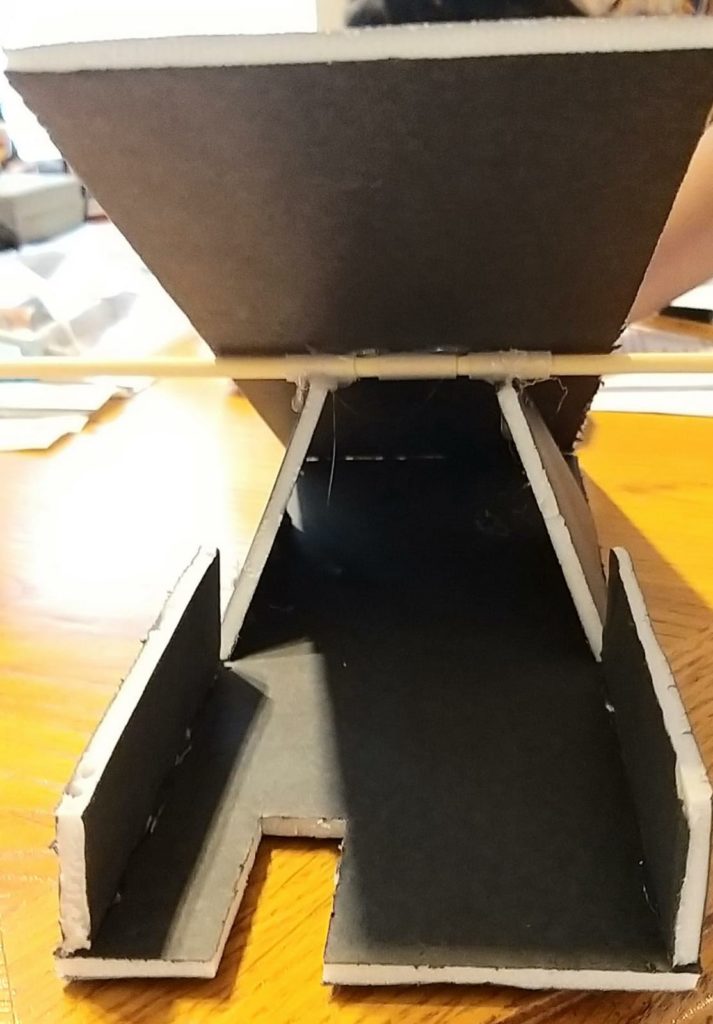
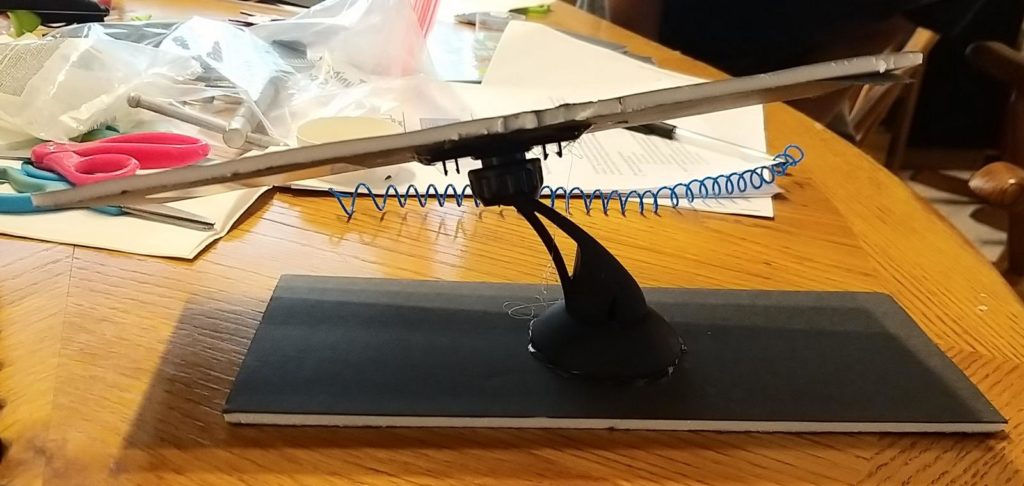
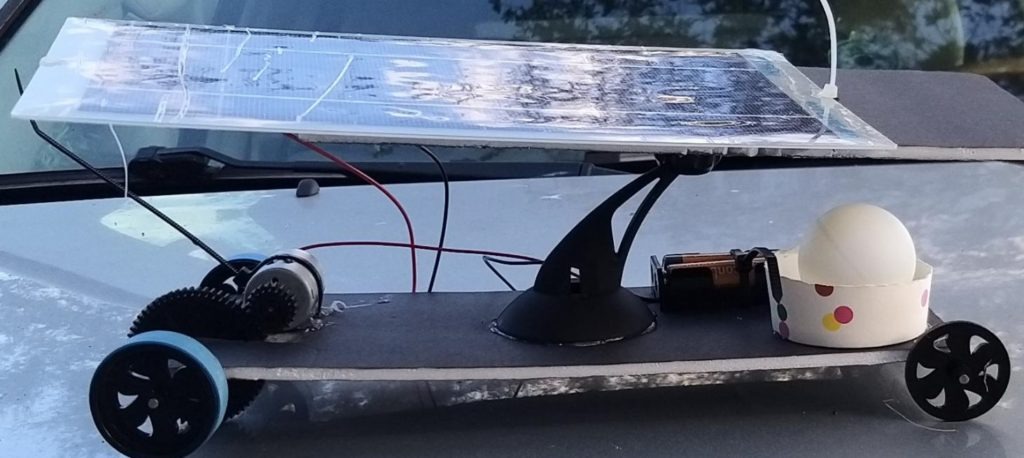
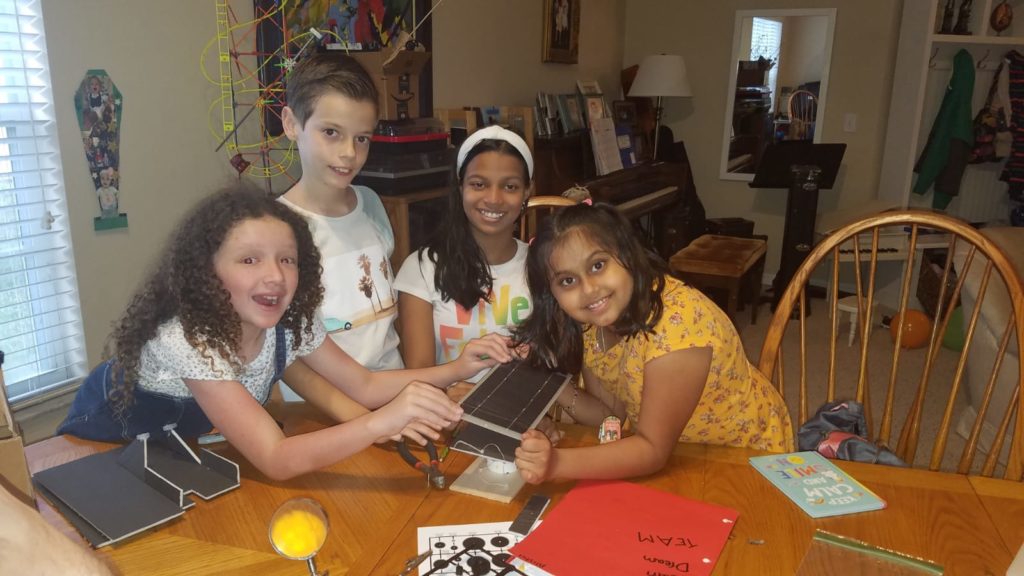
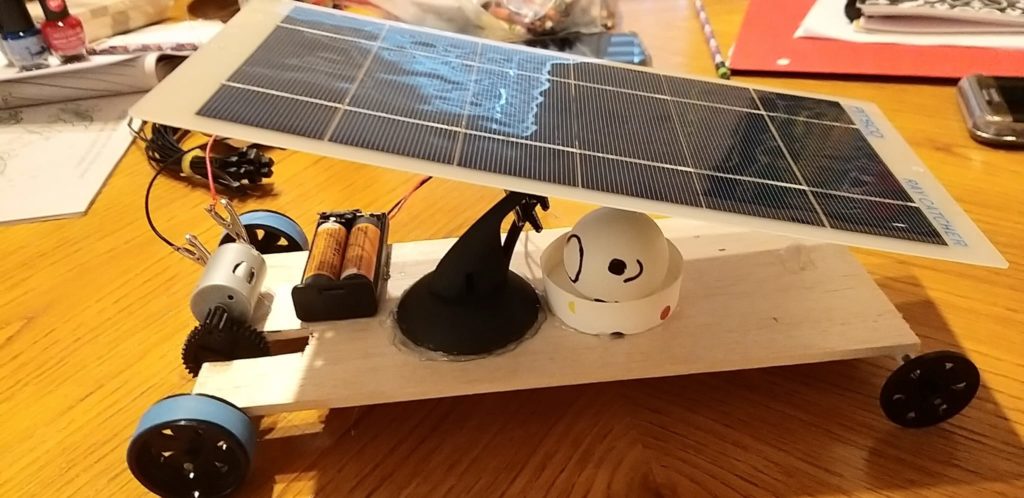
Finished Car Specifications:
Pictures:
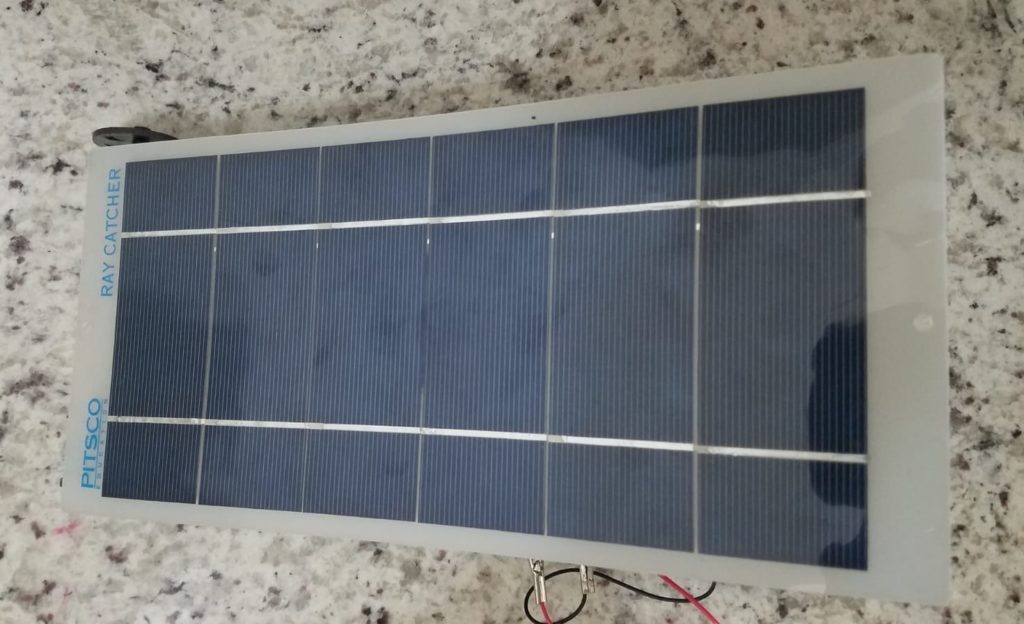
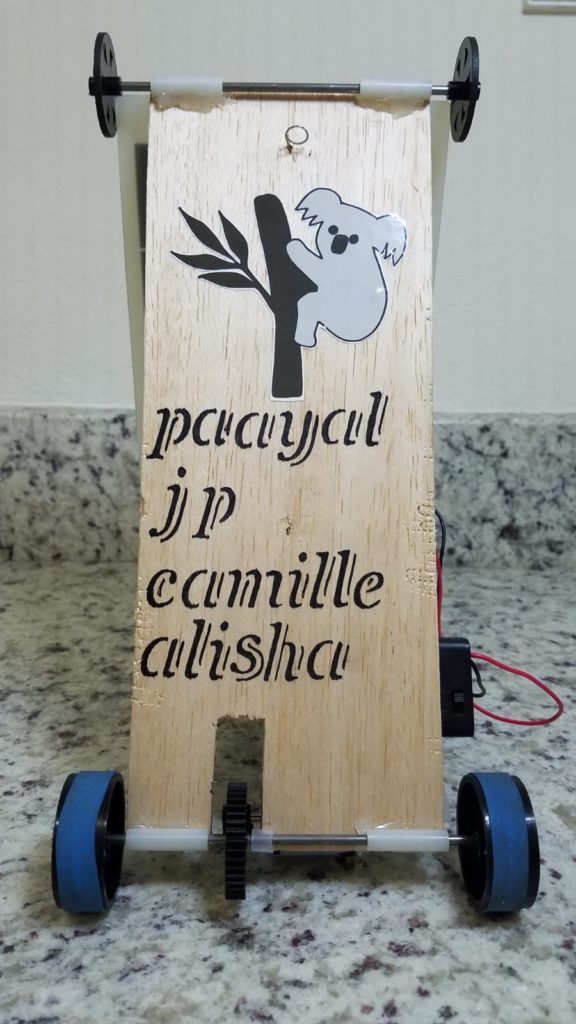
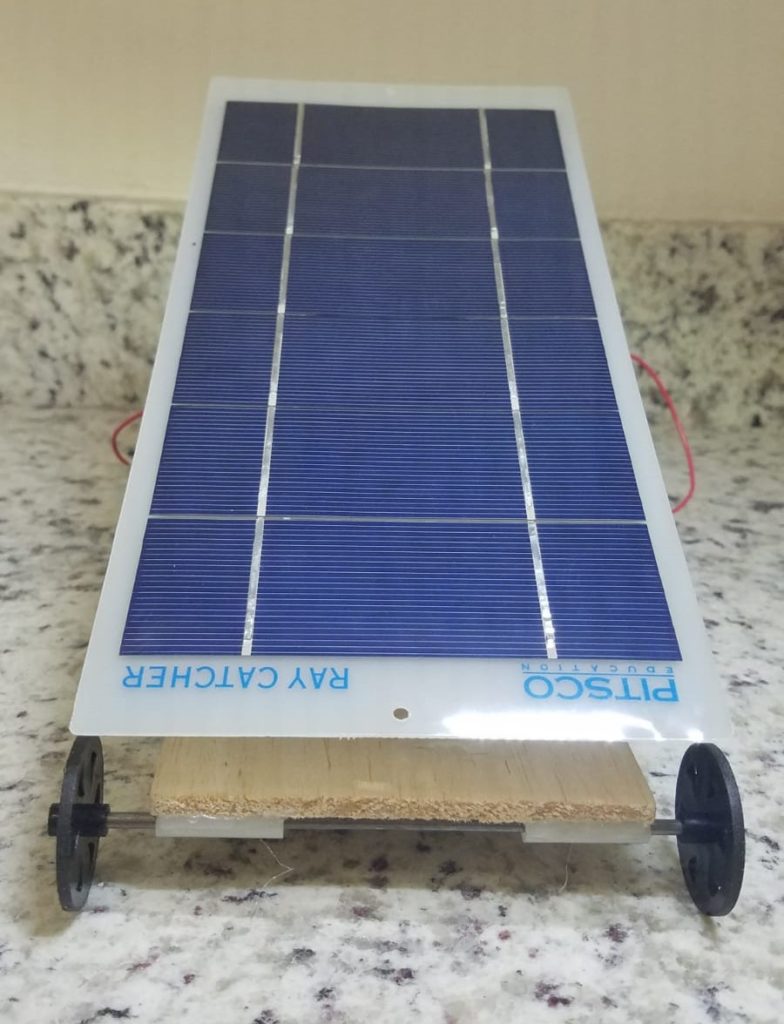
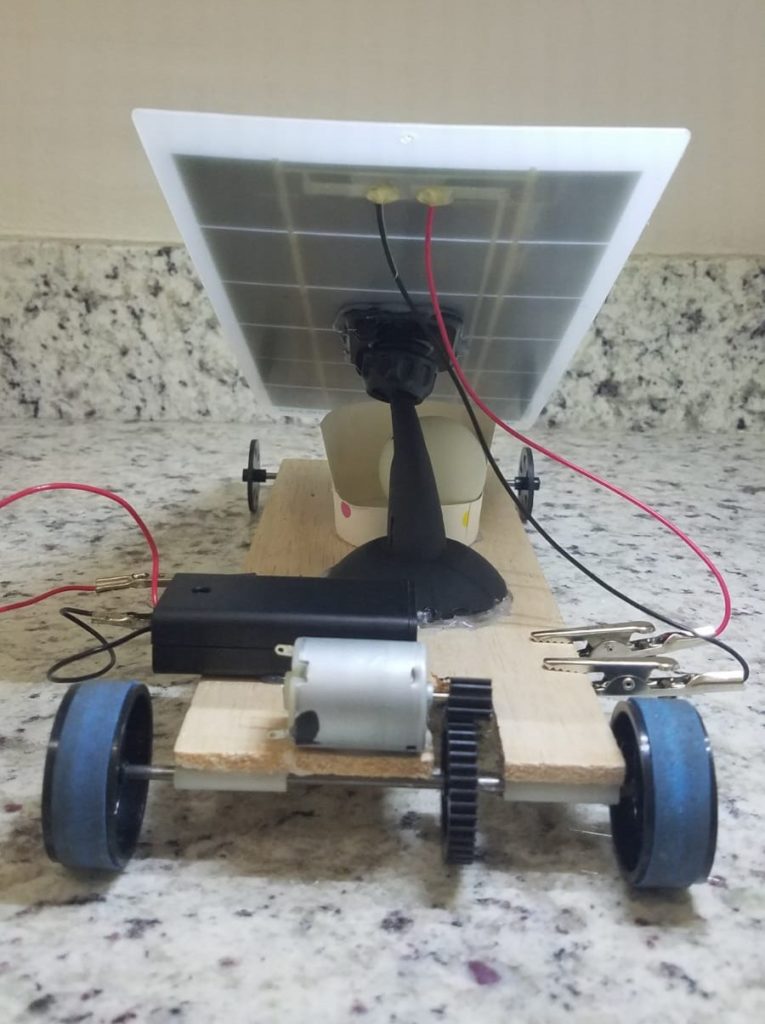
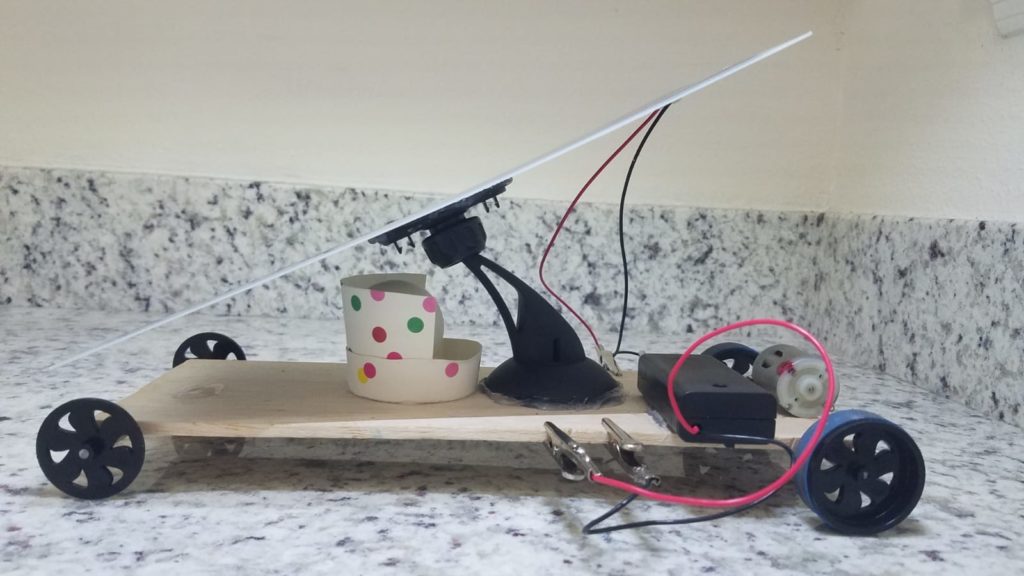
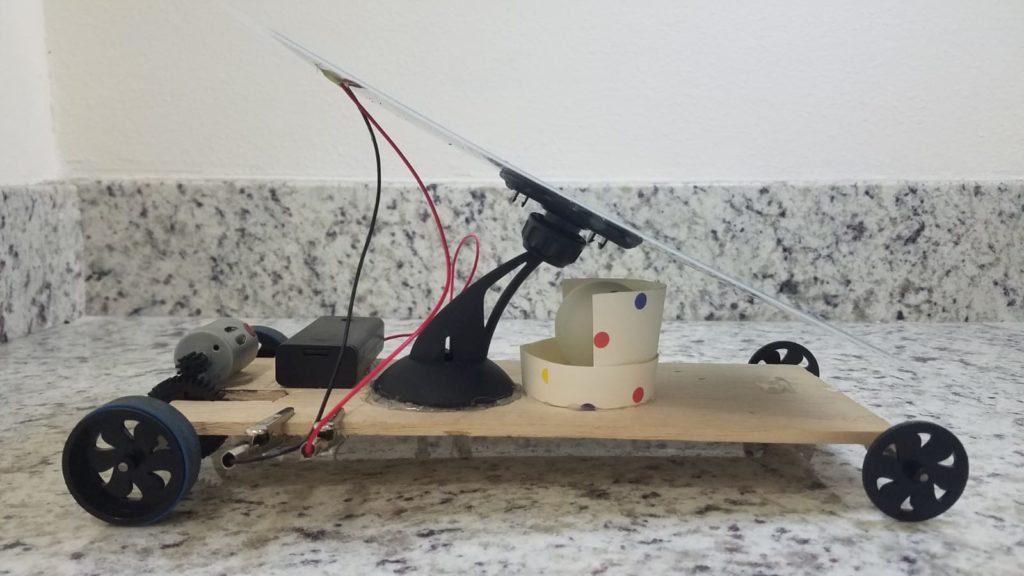
Length: 29 cm
Width: 14.2 cm
Height: 17 cm
Weight: 270 gms
Wheels: 4
Gear Ratio: 5:1
Control Steering: Monofilament guided wire
Chassis: Balsa wood
Seat: Paper cup
Enhancements: Pivoting mechanism for Solar panel
Top speed: 2.61 m/s (with solar power); 2.74m/s (with battery power)
Trial Run Results:
| Power Source: Solar Date and Time: 11/29/2022; Weather Conditions: Bright and Sunny Distance: 20 meters Observations: Not holding the guidewire tight made the car veer off to the left. We will test again to confirm that there is nothing else factoring in. |
| Attempt | Time (s) | Speed (m/s) |
|---|---|---|
| 1 | 7.77 | 2.57 |
| 2 | 7.66 | 2.61 |
| 3 | 7.92 | 2.52 |
| 4 | 7.92 | 2.52 |
| Power Source: Battery Date and Time: 11/26/2022; Weather Conditions: Cloudy and overcast Distance: 20 meters Observations: As the batteries discharged we could see the reduction in speed. |
| Attempt | Time (s) | Speed (m/s) |
|---|---|---|
| 1 | 7.29 | 2.74 |
| 2 | 7.39 | 2.70 |
| 3 | 8.03 | 2.49 |
Glossary:
Speed – Magnitude of change of an object’s position per unit time. It is measured as
Speed = Distance Traveled / Time taken
Rotation speed – is how many rotational events occurred per unit time. It is measured as
Rotational Speed = Rotations / Unit Time
Torque – is how much force is needed to cause an object to rotate about its axis. Just as force causes an object to accelerate during linear motion, torque causes an object to acquire angular acceleration.
Power – It is the mechanical output of the motor. It is measured as
Power = Torque X Rotational Speed
Gear – a rotating circular toothed machine part that meshes with another toothed part to transmit motion or change speed.
Gear Ratio – Ratio of the number of teeth on the two gears that are meshed. In this case, the number of rotations of the pinion gear to the number of rotations of the spur gear.
In Conclusion:
While our car uses a strong basic design concept of a solar powered car, it features enhancement like the ball socket joint that can maneuver the solar panel 360 degrees, which helps is maximizing the solar energy. We have minimized the weight by removing the unnecessary parts. We have considered ease of use by including a battery holder with an easy switch. This has accounted for the car to perform consistently in multiple test runs.
Additional Information:
Ideas for future enhancements:
We thoroughly enjoyed this attempt at energy efficiency and independence. We will continue to work on future enhancements to build a vehicle that is green energy driven with efficient fuel technologies, one that will work even in minimal sunlight and be cost effective in the long run. Some of the ideas we want to work on next –
a. Decreasing the weight of the car further by testing alternate materials.
b. Enhancements for boosting the solar energy.
c. Storing the solar energy for later use.
Credits:
Our STEAM Teachers – Mrs. Fillenwarth and Mrs. Porter
Our Parents
Resources – pitsco.com, khanacademy.com, academickids.com

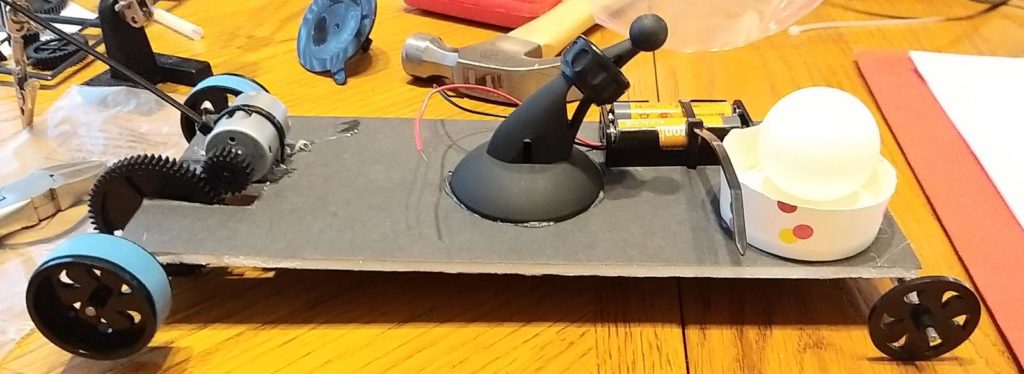
I am super impressed by your efforts and incredibly proud of your accomplishments with this project! Excellent work creating a solar powered vehicle and excellent work reimagining and improving to make your final model such a success! Way to go, team!
Wonderful cycle of ideation, execution and interospection for the future. Good job Paayal, JP, Camilla and Alisha. I loved the narration on the page – it’s almost like a story. Good luck!
This is awesome.. The details and the execution seems to be soooo well done..
Fabulous job..!! Loved reading through this.. 😍
Very well-thought and implemented projects! Kudos to the entire team for achieving success with relentless efforts! You guys have already won the competition with your perseverance, it’s time to show it to the world!
Go for it ❤️ All the best and wish you guys great success and plenty of fun!
Great job by Paayal, JP, Camille and Alisha. You have not just conceptualised the theorey but shown it in practice. You’ll will make this world a better place to live in the future with bright and green ideas like these.
Outstanding work! I can tell you had to put a lot of effort into this project. Keep up the good work!
This is awesome! Very KOALA-TY work! We are very proud of you. 🙂
-Mrs. Walls
This is an amazing group of smart kids. I’m very impressed at the work accomplished here.
Very thorough in your engineering process! Great job!!!
Congratulations to Paayal, JP, Camille and Alisha. What an amazing effort and result. I am mighty impressed that these kids in 4th and 5th grades have been inspired to change the world.
Coming up with ideas is easy. Most people do that. But you all (Paayal, JP, Camille and Alisha) have pursued it to the next steps. Created a design. Worked on the prototype relentlessly and delivered an end product. And it works. It’s amazing to watch.
I am very proud of these 4 kids. Thanks to the school for encouraging this project. And the parents for their unyielding support and time invested.
Very happy to see this. Congratulations to Paayal, JP, Camille and Alisha again.
I’m absolutely thrilled to see the creativity, thinking, and enthusiasm shown by Payal, JP, Camille and Alisha in creating ‘ Light Year’ which is not only fancy but also economically efficient too. Definitely impressive!!! Keep it up !!!
I am blown away with the amount of time and energy you poured into this project! You all are AMAZING!
I am incredibly impressed with this awesome team! Alisha, Camille, Paayal, and JP worked very hard and persevered when met with a challenge. Way to go, team!
Wow! I am impressed. You did an excellent job collecting data and documenting your progress.